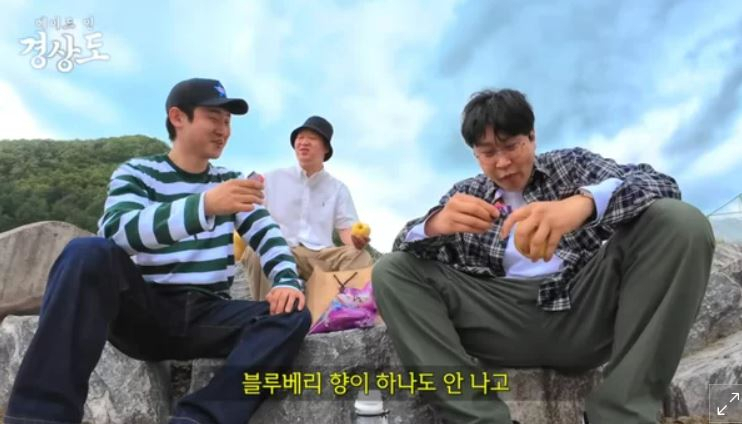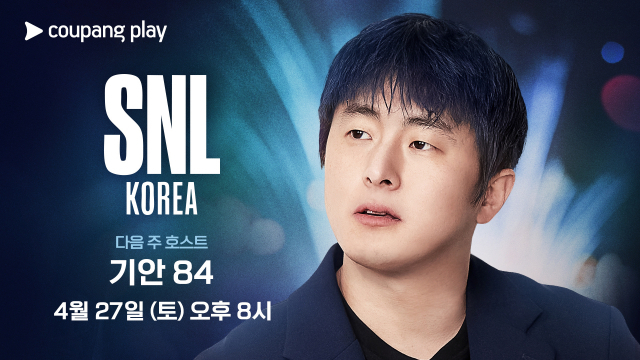 |
A screenshot from "We Came to Yeongyang, the Smallest City in Gyeongsang Province," (direct translation) starring Kim Min-su, (left) Jung Jae-hyung (center) and Lee Yong-ju (Psick Univ YouTube channel) |
A rash of complaints about offensive remarks on online variety shows have stirred up controversy over the relatively light regulation given to online-only content.
Some experts argue that while the freedom given to digital platforms helps enrich Korea's content landscape, there is also a need for new regulations to guard against the potentially damaging effects of some shows.
YouTube channel Psick Univ, featuring comedians Lee Yong-ju, Kim Min-su and Jung Jae-hyung, recently caused controversy with comments about rural Korea.
The channel, which had over 3.1 million subscribers, lost over 210,000 subscribers over the course of three weeks after posting a video titled, "We Came to Yeongyang, the Smallest City in Gyeongsang Province" (direct translation), on May 11.
In the video, the three comedians tour Yeongyang while frequently making negative comments about the place, describing a local river as "filled with manure," and locally made blueberry jelly as tasting like "a grandmother's flesh."
The video faced immediate criticism, with online comments claiming the video sold hatred and mockery as humor, and arguing that they were discriminatory against people from rural areas.
In response to the mounting criticism, Psick Univ, on May 18, released an apology letter in the channel's Community section and made the video in question private.
"We apologize to all those who have been harmed due to our immaturity," said Psick Univ via the announcement.
"We deeply regret not having fully considered the negative impact it could have on the community."
"The virtues of comedy are amplified, and their authenticity and significance can be realized when aimed at powerful political and economic authorities," said Ryu Woong-jae, a professor of media communications at Hanyang University, on Wednesday.
"The freedom of expression utilized by media and popular culture cannot become a transcendent right that allows for infringing upon others' freedom and cultural sensitivity. There must be clear limits and restraints, and this applies to content on streaming services and YouTube as well."
Psick Univ is not the only variety show on YouTube or other online video platforms that has sparked controversy.
Veteran comedian Lee Kyung-kyu was also criticized for making negative remarks about Jindo dogs and filming passersby without their consent on his YouTube channel, "Lekeke Lee Kyung-kyu" (direct translation).
In a video uploaded on May 10, which aimed to find people who specifically show polite behavior while walking their dogs, Lee singled out Jindo dogs for not wearing muzzles, even though other large dogs were also shown without muzzles. The Jindo breed is not among those required to wear a muzzle in public according to Korean law.
This video created immediate controversy, with viewers even accusing Lee of promoting hate against Jindo dogs.
Criticism also poured in about Lee filming dog owners walking their dogs without their consent.
The channel's production team later issued a statement apologizing for causing distress to pet owners and acknowledged its narrow depiction of Jindo dogs and their owners, while promising to account more carefully for the diverse perspectives and emotions of viewers in the future.
 |
Poster for "SNL Korea Season 5," featuring Kim Hee-min (Coupang Play) |
Webtoon writer and TV personality Kim Hee-min, also known by his nickname, Kian84, was fined recently while hosting the ninth episode of "SNL Korea Season 5" on Coupang Play, due to a scene depicting him smoking indoors.
After viewers reported him, Kim was fined 100,000 won ($72) for smoking in the studio, in breach of the National Health Promotion Act, which bars smoking in designated types of buildings.
Pop culture critic Kim Hern-sik said that the creative freedom online content has could help the wider industry, while digital platforms offer the advantage of introducing Korean content to audiences overseas.
"Every time a new form of media is introduced, a new type of venture is made to create (content). Such content incentivizes broadcasters to generate more entertaining material, which, in turn, stimulates streaming services and web entertainment content creators. Consequently, a virtuous cycle is formed within the Korean content market and this fosters the creation of more evolved content," Kim told The Korea Herald on Wednesday.
However, he argued that the existing regulations, which allow streaming services and web content more lenient oversight, have resulted in increasingly provocative and offensive content.
Currently, traditional TV broadcasters are regulated by the Broadcasting Act, and digital platforms are regulated by the Information and Communications Network Act.
As a result, TV content is subject to numerous regulations related to profanity, alcohol consumption and sexual conduct on screen that digital content is exempt from.
Digital content is only specifically regulated in terms of disseminating information regarding illegal websites or illegal information.
Recently, streaming services have implemented a voluntary rating system for content, but Kim believes that is not enough.
Starting in April, Korean streaming service content providers designated by the Ministry of Culture, Sports and Tourism can voluntarily rate their content without having to go through the Korea Media Rating Board, in a bid to shorten the time it takes for their content to be reviewed.
"Content creators on these platforms following the voluntary rating system will probably exercise caution initially, but over time it could become challenging to maintain this system, considering the nature of online content relying on views and clicks," according to Kim.
As a solution, the critic said multiple measures should be enacted.
"Digital platforms should introduce autonomous regulations of their own. Simultaneously, it's also necessary for the Korea Communications Commission to establish new regulatory standards for a two-track approach," he said.
"Additionally, the roles of the media and consumers are both crucial. For problematic scenes, public criticism should be given without reservation. Boycotts and pressure from civil groups are also necessary because even a minor issue can lead to subscriber attrition on platforms such as streaming services," Kim said.







